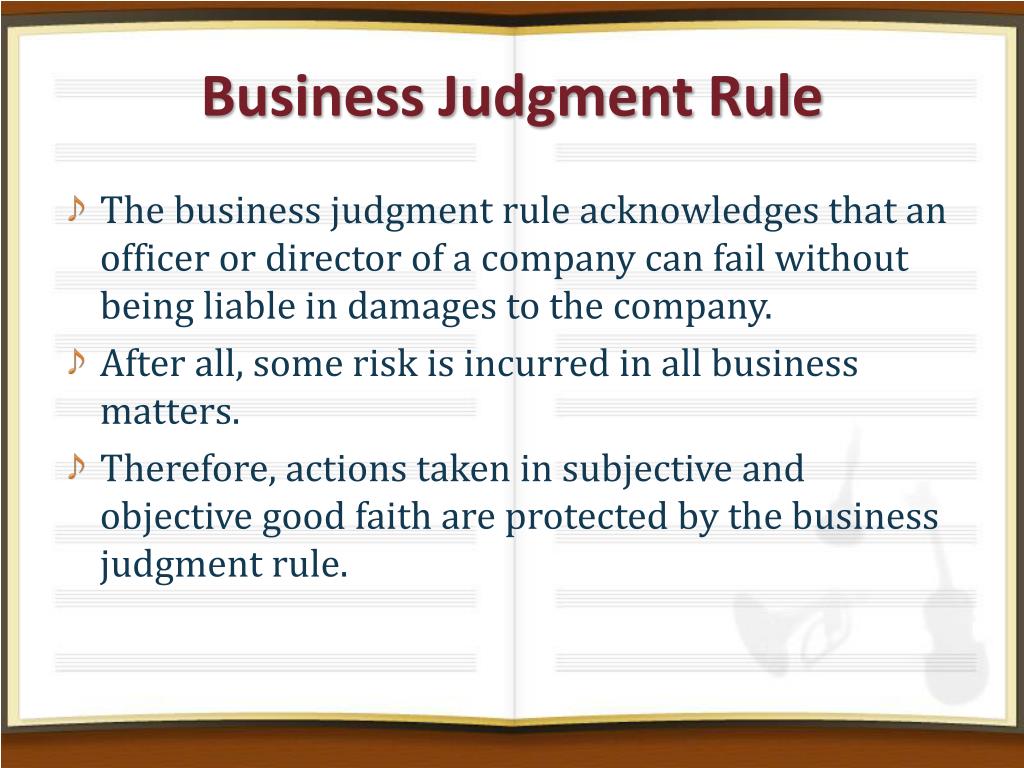Business Judgement Rule Test
Business Judgement Rule Test. The business judgment rule (rule), the most prominent and important standard of judicial review under corporate law, protects a decision of a corporate board of directors (board) from a fairness review (“entire fairness” under delaware law) unless a well pleaded complaint provides sufficient evidence that the board has breached its fiduciary duties or that the. The business judgment rule is a concept applied by canadian courts in reviewing the decisions of a board of directors of a corporation.

“courts must give deference to a condominium association’s decision if that decision was: The extent of a director's duty of care and skill depends on the nature of the company's business, that our law does not require a director to have special business acumen, and that directors may assume that officials will perform their duties honestly. The idea behind the business judgment rule definition is to ensure that board directors won't suffer legal action simply because they made a poor decision.
The Business Judgment Rule Is A Presumption That In Making A Business Decision Directors Have Acted On An Informed Basis, In Good Faith And In The Honest Belief That The Action Taken Was In The Best Interests Of The Company. Id.
Lawshelf is a project of national parale. Ultimately, the [trial] court gave judgment for the association, applying what it called a business judgment test. lamden appealed. The reason for this inclusion of the discussion on the business judgement rule, is because firstly the business judgement rule is closely related to the duty of care, skill and diligence to be exercised by a director, as well as because the business judgement rule is a new inclusion, which has now been codified in south african company law.
The Business Judgment Rule And The Entire Fairness Doctrine Structurally, The Business Judgment Rule Has Two Components.
Benefit corporations aim to promote public good; Are clothed with presumption, which the law accords to them, of being in their conduct by a bona fide regard for the interests of the corporation whose affairs the. The business judgment rule (rule), the most prominent and important standard of judicial review under corporate law, protects a decision of a corporate board of directors (board) from a fairness review (“entire fairness” under delaware law) unless a well pleaded complaint provides sufficient evidence that the board has breached its fiduciary duties or that the.
Therefore, Transactions Outside The Ordinary Course Of A Corporation’s Business Might Not Be Protected Under The Business Judgment Rule.
However, the business judgment rule can only be used if all the requirements as set out in the act are complied with. The business judgment rule comes into play for lawsuits where a corporate director takes an action that affects the corporation and a plaintiff sues under allegations that the corporate director violated the duty of care. Business judgment test [under section 363(b)(1)].” 39 in short, courts have held that section 503(c)(3) imposes a more demanding.
“Courts Must Give Deference To A Condominium Association’s Decision If That Decision Was:
On one hand, directors will apparently be held to a higher standard of conduct and responsibility and will be measured by both a subjective and. Section 76 (3) of the act deals with the respective duties of directors, and states that directors perform duties in good faith, in the best interest of the company and with care, skill and diligence that may reasonably be expected of a person. The courts must give appropriate deference to the business judgment of the directors, who are in the best position to take into account the diverse interests of the corporation and its stakeholders (including what weight to give the stakeholder interests).
It Is Rooted In The Principle That The Directors Of A Corporation.
Under the business judgement rule, the board of directors of a corporation is given the freedom to conduct business and is protected from the courts digging into their business deals or decisions due to unfair or unwarranted allegations. Board's authority and presumed expertise. The extent of a director's duty of care and skill depends on the nature of the company's business, that our law does not require a director to have special business acumen, and that directors may assume that officials will perform their duties honestly.
Post a Comment for "Business Judgement Rule Test"